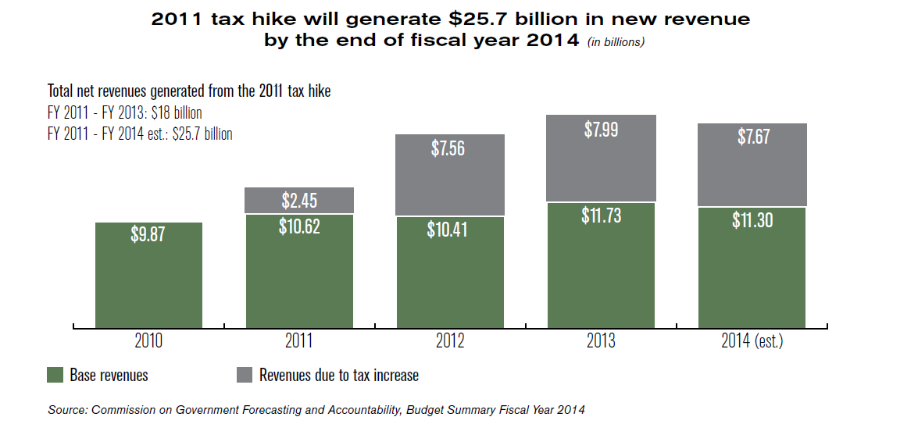Myth: The temporary 2011 tax increase was necessary to pay down Illinois’ backlog of bills, stabilize the state’s pension crisis and strengthen its economy.
Fact: Since the tax increase was passed, Illinois’ unpaid bills and pension debt have grown, and the state’s economy is among the worst in the nation.
Illinois lawmakers in January 2011 pushed through a record income tax increase that raised the income tax rate on individuals to 5 percent from 3 percent, and on corporations to 7 percent from 4.8 percent. They called it the Taxpayer Accountability and Budget Stabilization Act and went on record making the following promises:
“We have some temporary tax increases that are designed to pay our bills, get Illinois back on fiscal sound footing and make sure that our state has a strong economy.” —Gov. Pat Quinn
“The purpose of this bill is to raise enough money so that we can continue to pay our pensions without borrowing the money, to pay off our debt, to have enough money to pay the interest on that debt …” —Senate President John Cullerton
“… remember the point of this income tax increase is not to expand programs, not to do brand new things in Illinois state government, it is only intended to pay our old bills and deal with the structural deficit.” —House Majority Leader Barbara Flynn Currie
Illinois’ political leaders said the goal of this tax hike was to pay down the state’s backlog of bills, stabilize the state’s pension crisis and strengthen its economy. Almost three years and more than $18 billion in new tax revenue later, lawmakers have failed to keep their promises. The state’s pension debt and backlog of bills have grown, and its economy is among the worst in the nation. And by the end of the current fiscal year, lawmakers will have collected a total of $25.7 billion in new revenue from the tax hike – straight from the pockets of hard-working businesses and individuals in Illinois.
Some individuals would have you believe that not only is Illinois better off because of the extra revenue from the 2011 tax hike, but also that Illinoisans should be thankful for paying higher income taxes. But the data tell a different story –Illinois’ finances are a disaster. The extra revenue only allowed lawmakers to skirt meaningful reforms as the state’s fiscal crises continued to worsen.
Unpaid bills: $9 billion by December 2013
In January 2011, the month the tax hike was passed, Illinois’ unpaid bills totaled $8.5 billion.
Illinois Comptroller Judy Baar Topinka estimates that Illinois’ backlog of unpaid bills will total about $9 billion in November and December in 2013. Not only did lawmakers fail to pay down the unpaid bills, but the backlog actually grew.
Interest payments: 2.5 times higher than 2011
Illinois is required by law to pay interest of 1 percent per month on its unpaid bills when they become more than 90 days old. In 2011 the interest payments on Illinois’ unpaid bills totaled $53 million. By 2013 that number had grown to more than $186 million, or 2.5 times more what the state paid in 2011.
Credit rating: downgraded five times since the tax hike
Illinois has been downgraded five times since the 2011 tax hike – twice by Moody’s Investors Service, twice by Standard & Poor’s Ratings Services and once by Fitch Ratings. Now Illinois stands only four notches away from junk-bond status. The additional revenue that allowed lawmakers to avoid real reform only worsened the state’s fiscal footing.
Pension debt: increased by $17 billion
Despite dumping billions of the additional tax hike revenue into the state’s pension systems, Illinois’ pension debt continued to grow uncontrollably. The state’s official unfunded pension liabilities will grow to more than $100 billion during the current fiscal year, up from $83 billion in 2011. That’s because the problem isn’t a lack of revenue; rather it’s that defined benefit pension plans are inherently unmanageable.
Unemployment: second-highest in the nation
In January 2011, the same month as the tax hike, Illinois’ unemployment rate was similar to the national average – both more than 9 percent. Today, Illinois’ unemployment rate is 9.2 percent while the national average has dropped to 7.3 percent.
Food stamps: more people to food stamps than to payroll jobs
Since January 2011, Illinois has added more than 245,000 people to its food stamp rolls while adding only 131,000 payroll jobs during the same time.
The tax hike failed
Lawmakers sold the 2011 tax hike as a temporary increase. But now the 2015 sunset date is closing in and politicians are trying to backtrack on that promise with efforts to make the tax hike permanent.
Illinois House Deputy Majority Leader Lou Lang, D-Skokie, introduced legislation that would make the record 2011 income tax hike permanent and use the higher taxes to make pension payments. Lang thinks it’s a no-brainer: “I don’t think there’s anyone in this building who doesn’t believe we need to extend the income tax increase.”
State Rep. Elaine Nekritz, D-Northbrook, agrees: “Including the income tax increase as part of the solution, to me, is already being part of the solution. … It’s actually how we’re making the pension payments right now.”
And Senate President John Cullerton says that it’s time to honestly face the future about sunsetting the 2011 tax hike. Cullerton said making it permanent isn’t a lie because: “Gov. [Jim] Edgar proved that you don’t have to lie. You can say that I think we should keep it at a certain rate.”
The $18 billion in tax-hike revenue that taxpayers gave political leadership did nothing to stabilize Illinois’ finances. And the additional $7.7 billion that taxpayers will fork over this year won’t do the trick either. The fact is Illinois doesn’t have a revenue problem; the state has a spending problem.

